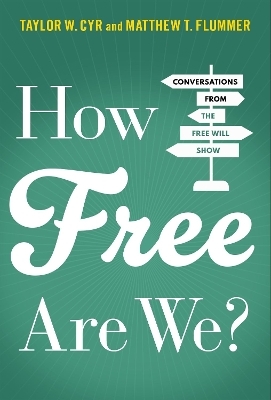
How Free Are We?
Oxford University Press Inc (Verlag)
978-0-19-765750-8 (ISBN)
Free will comes up in everyday conversations all the time. "She did that of her own free will." "He could have done something else instead." "It's my choice." "That's up to you." How we think about free will-and the closely-related concept of moral responsibility-is essential to how we think about our lives. We frequently praise and blame each other, and ourselves, for the choices we make, believing that this is appropriate because the person we're holding responsible possesses free will. But what does it mean to have free will? Do any of us have it at all? If so, then how much? These and related questions are at the heart of debates about free will in philosophy.
How Free Are We? contains a collection of edited interviews from The Free Will Show, a podcast by the philosophers Taylor W. Cyr and Matthew T. Flummer, highlighting recent developments on the topic. In an accessible and conversational format, a variety of scholars introduce the main issues and arguments in the free will debate, including various apparent threats to free will-such as fatalism, foreknowledge, and determinism-as well as the Consequence Argument, and the problem of luck. After building this foundation, later interviews introduce main positions and questions in debates surrounding free will, including several varieties of libertarianism, compatibilism, a version of free will scepticism, and others that do not fit neatly into any of these categories. With original introductions, bibliographies, and suggestions for further reading to accompany each interview, in addition to an afterward and a glossary of terms, How Free Are We? serves as a primer for those seeking an introduction to the topic and a window into what leading philosophers are currently thinking about and debating in this field.
Taylor W. Cyr is Assistant Professor of Philosophy at Samford University. Prior to this, he was a lecturer in the philosophy department at Washington University in St. Louis. He has written several articles on issues at the intersection of ethics and metaphysics, focusing on free will and moral responsibility. Matthew T. Flummer is Professor of Philosophy at Porterville College. His research, which primarily focuses on free will, moral responsibility, and the philosophy of religion, has appeared in various academic journals.
Introduction: Let's Talk about Free Will
Chapter 1: Taylor Cyr and Matthew Flummer on Free Will Basics
Chapter 2: John Martin Fischer on Fatalism, Foreknowledge, and Determinism
Chapter 3: Alicia Finch on Logical Fatalism
Chapter 4: Linda Trinkaus Zagzebski on Divine Foreknowledge
Chapter 5: Peter van Inwagen on the Consequence Argument
Chapter 6: Alfred Mele on the Problem of Luck
Chapter 7: Carolina Sartorio on Frankfurt Cases
Chapter 8: Derk Pereboom on the Manipulation Argument
Chapter 9: Dana Kay Nelkin on Moral Luck
Chapter 10: Christopher Evan Franklin on Event-Causal Libertarianism
Chapter 11: Timothy O'Connor on Agent-Causal Libertarianism
Chapter 12: David Palmer on Non-Causal Libertarianism
Chapter 13: Gregg Caruso on Free Will Skepticism
Chapter 14: Helen Beebee on Classical Compatibilism
Chapter 15: Kadri Vihvelin on Dispositional Compatibilism
Chapter 16: Michael McKenna on Source Compatibilism
Chapter 17: Manuel Vargas on Revisionism
Chapter 18: Seth Shabo on Mysterianism
Afterword: Reflections on The Free Will Show
Free Will Glossary
| Erscheinungsdatum | 06.09.2023 |
|---|---|
| Verlagsort | New York |
| Sprache | englisch |
| Maße | 135 x 198 mm |
| Gewicht | 522 g |
| Themenwelt | Geisteswissenschaften ► Philosophie ► Erkenntnistheorie / Wissenschaftstheorie |
| Geisteswissenschaften ► Philosophie ► Ethik | |
| Sozialwissenschaften ► Pädagogik | |
| ISBN-10 | 0-19-765750-8 / 0197657508 |
| ISBN-13 | 978-0-19-765750-8 / 9780197657508 |
| Zustand | Neuware |
| Informationen gemäß Produktsicherheitsverordnung (GPSR) | |
| Haben Sie eine Frage zum Produkt? |
aus dem Bereich

![Was heißt Denken?. Vorlesung Wintersemester 1951/52. [Was bedeutet das alles?] - Martin Heidegger](/media/113619842)
